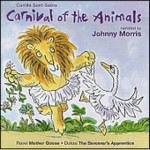
Saint-Saens: Carnival Of Animals (with Ravel-Mother Goose Suite)
 $25.00
Low Stock
add to cart
$25.00
Low Stock
add to cart
CAMILLE SAINT-SAENS
Saint-Saens: Carnival Of Animals (with Ravel-Mother Goose Suite)
Johnny Morris (narrator) / Slovak Radio Symphony Orchestra / Ondrej Lenard (conductor)
[ Naxos / CD ]
Release Date: Wednesday 30 July 2008
Should this item be out of stock at the time of your order, we would expect to be able to supply it to you within 2 - 5 business days.
The French composer Camille Saint-Saëns was prolific and lived a long time, although by the time of his death in 1921 music had changed beyond anything he could have conceived. He was a gifted pianist and, in common with many other well known French composers, found employment and distinction as organist at one of the principal churches in Paris. The popular Carnival of the Animals, described as A Zoological Fantasy, was written in 1886, originally for two pianos and a small chamber orchestra to celebrate that year's carnival. The composer forbade further performances of this occasional music, except for The Swan, which enjoyed immediate and irresistible popularity.
The pianos open the work in a brief introduction that seems to suggest the roar of the lions, before the Royal March begins, with its suggestions of the exotic in its theme. Cocks and Hens are as true to nature as the composer can make them, followed by Wild Asses of unexpected rapidity of motion, in contrast to the lumbering Tortoise, who offers a can-can at the slowest possible speed, putting a foot wrong here and there. The Elephants are naturally represented by the double bass in an episode that includes a direct quotation of the highly inappropriate Ballet of the Sylphs by Berlioz. The pianos alone then imitate the capricious leaps of the Kangaroos, to be followed by an evocation of the Aquarium. People with Long Ears, critics, are portrayed by piercing whistles and the braying of donkeys, while pianos and clarinet bring in the Cuckoo, followed by the rest of the Birds, with the help of the flute. Pianists, creatures not usually found in zoos, practice their scales, heavily accented, and are followed by Fossils, with tunes of undoubted antiquity and interesting activity for the xylophone. The Swan sings its dying song on the cello, reminding us now of the dance devised by Fokin for the great Anna Pavlova. The fantasy ends with a summary of much that has gone before.
Tracks:
Saint-Saens:
Carnival of the Animals
Ravel:
Mother Goose
Dukas:
The Sorcerer's Apprentice
